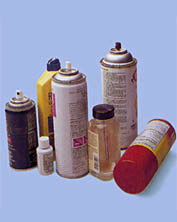| Brief Description: | Inhalants are breathable chemical vapors that users intentionally inhale because of the chemicals' mind-altering effects. The substances inhaled are often common household products that contain volatile solvents, aerosols, or gases. |
| Street Names: | Whippets, poppers, snappers More at Street Terms (Office of National Drug Control Policy Web Site) |
| Effects: | Most inhalants produce a rapid high that resembles alcohol intoxication. If sufficient amounts are inhaled, nearly all solvents and gases produce a loss of sensation, and even unconsciousness. Irreversible effects can be hearing loss, limb spasms, central nervous system or brain damage, or bone marrow damage. Sniffing high concentrations of inhalants may result in death from heart failure or suffocation (inhalants displace oxygen in the lungs). |
| Statistics and Trends: | In 2008, 2 million Americans age 12 and older had abused inhalants. Source: National Survey on Drug Use and Health(Substance Abuse and Mental Health Administration Web Site). The NIDA-funded 2008 Monitoring the Future Study showed that 8.9% of 8th graders, 5.9% of 10th graders, and 3.8% of 12th graders had abused inhalants at least once in the year prior to being surveyed. Source: Monitoring the Future (University of Michigan Web Site) |
NIDA NOTES:
Other NIDA Resources on Inhalants
- Inhalants.Drugabuse.gov - a specialized content NIDA site on Inhalants
- Inhalants (NIDA for Teens site)
- Mind Over Matter - Inhalants (NIDA for Teens site)

No comments:
Post a Comment